How to Make Chicken Stock
Updated Jun 17, 2021
Learn how to make this easy homemade chicken stock recipe on the stovetop or in your Instant Pot/Pressure Cooker - with storage tips & freezing instructions
This post may contain affiliate links. Please read our disclosure policy.
Here’s how to make simple, homemade chicken stock with a chicken carcass (hello, supermarket rotisserie leftovers!) and a few kitchen staples. I guarantee homemade stock will amp up the flavor in your soups, grain dishes, and anywhere else you use stock/broth. I’ll show you how to make it on the stovetop and instant pot.
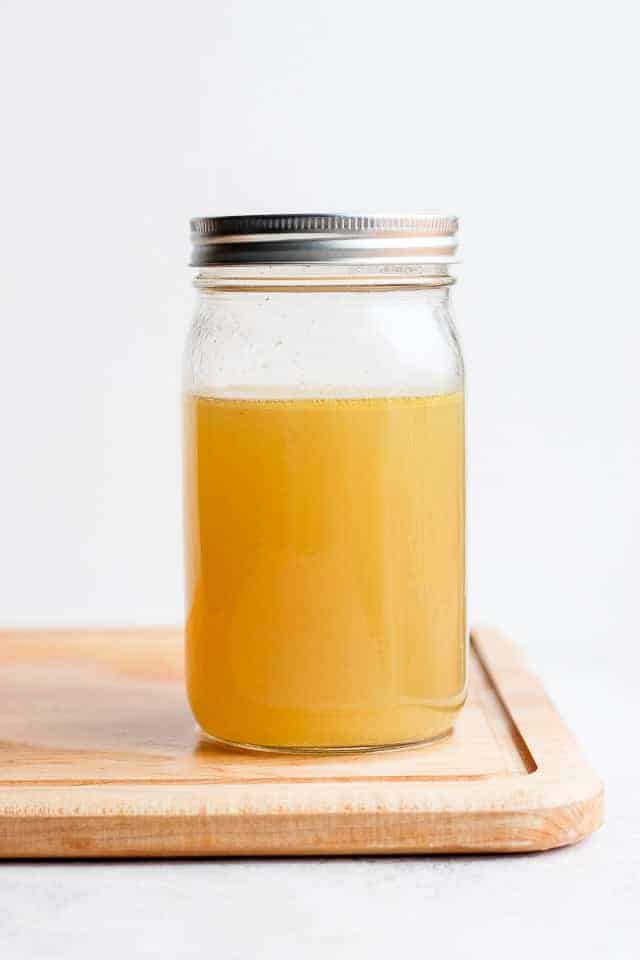
What is chicken stock?
Chicken stock is made from vegetables and chicken bones – cooked or uncooked, meat and skin attached are okay – long-simmered with water to create a rich, flavorful base.
Stock vs. broth
Many use the terms interchangeably, but they are different. They both contain chicken and vegetables, typically the standard mirepoix mix of onions, carrots, and celery. But stock always includes chicken bones. When cooked long and slow, the bones yield up their gelatin and collagen giving the stock a rich, smooth texture.
Also, another notable difference is that stock is unsalted while, broth is a flavored, seasoned, sippable soup.
Stock uses
Chicken stock is the cornerstone of so many recipes. It is the liquid ingredient in many soups; makes a flavor-packed sub for water when cooking grains like rice and quinoa; and can also be used in stews, curries, and gravies.
How to make chicken stock
Stovetop cooking instructions
- Place the vegetables and herbs in a stock pot.
- Place the chicken bones on top.
- Add the cold water and slowly bring to a simmer, skimming off any brown foam. Note: You want to cover at least three-quarters of your bones and veggies, so your eyeballs are as important as the measuring cup.
- Once the stock has come to simmer, continue to cook covered on a low burner for four hours.

After a few hours, you’ll notice the water color will change, the carcass and the vegetables will soften. Then, the stock is pretty much ready to strain and use.

Cool and strain the stock using a fine mesh strainer. You should have about 4 cups of stock.
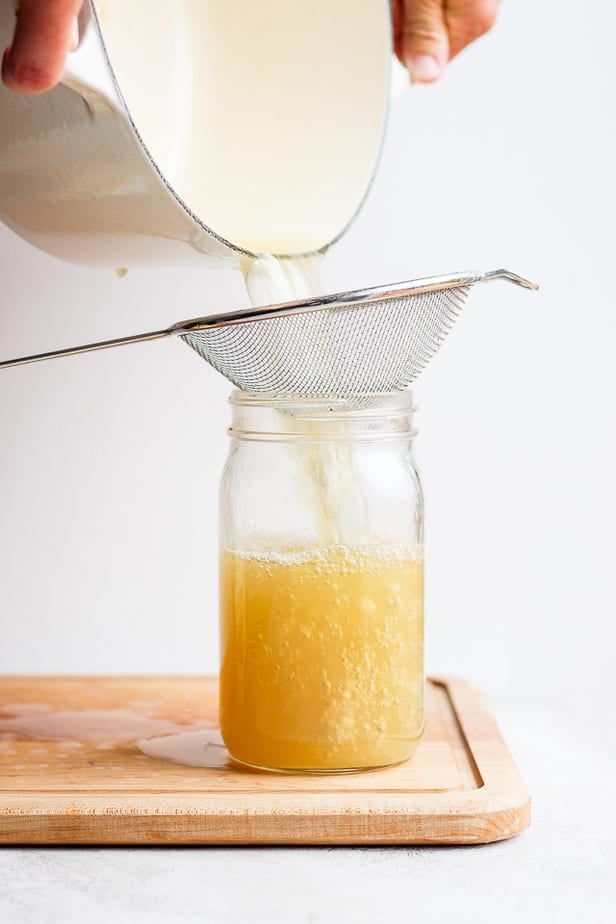
Instant Pot/pressure cooker instructions
- Place vegetables and herbs in the Instant Pot.
- Place chicken bones on top. It’s okay if meat and skin are attached to the bones but do not leave on too much fat.
- Add the cold water. You want to cover your vegetables and bones by at least three-quarters. Make sure you are adding enough water so you do not get a burn message on your Instant Pot.
- Seal the lid and select high pressure for 20 minutes or use the stock setting on the pressure cooker.
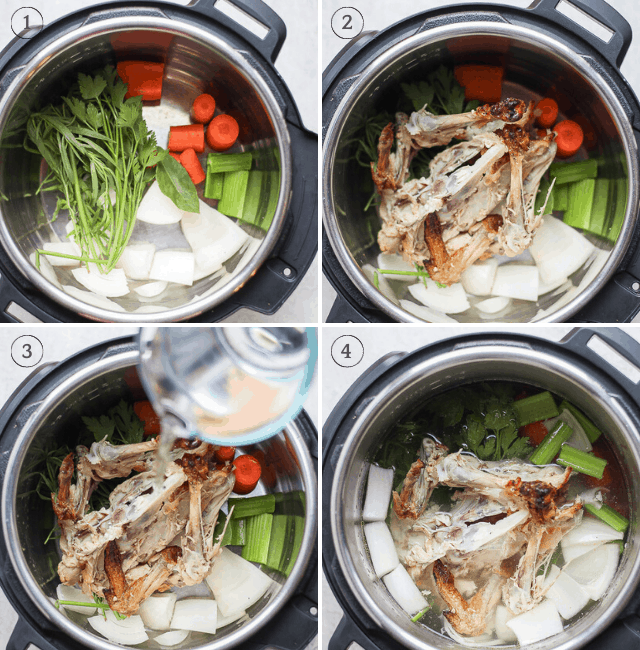
This may be slightly different if you’re using another pressure cooker, but it’s a similar idea.
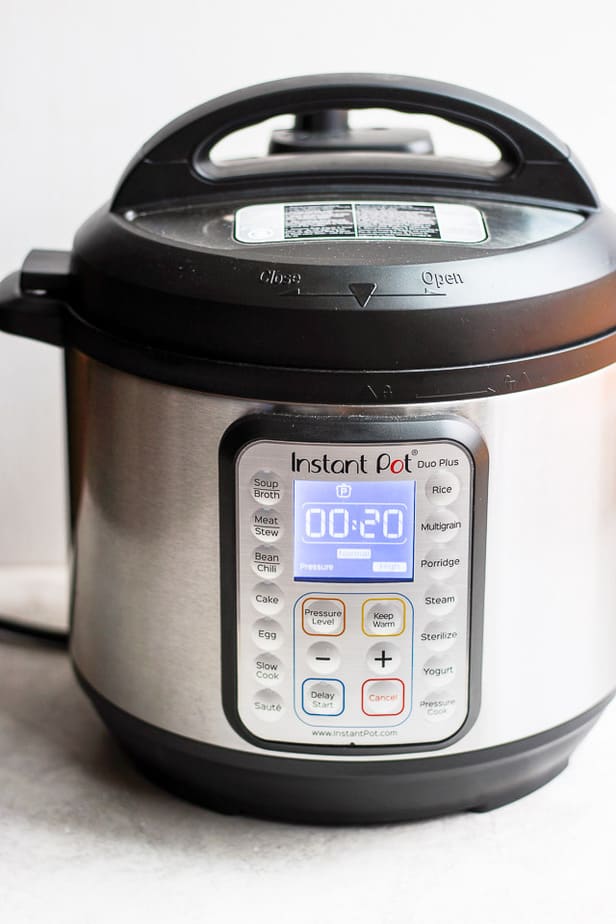
Once the time is up, release pressure naturally.
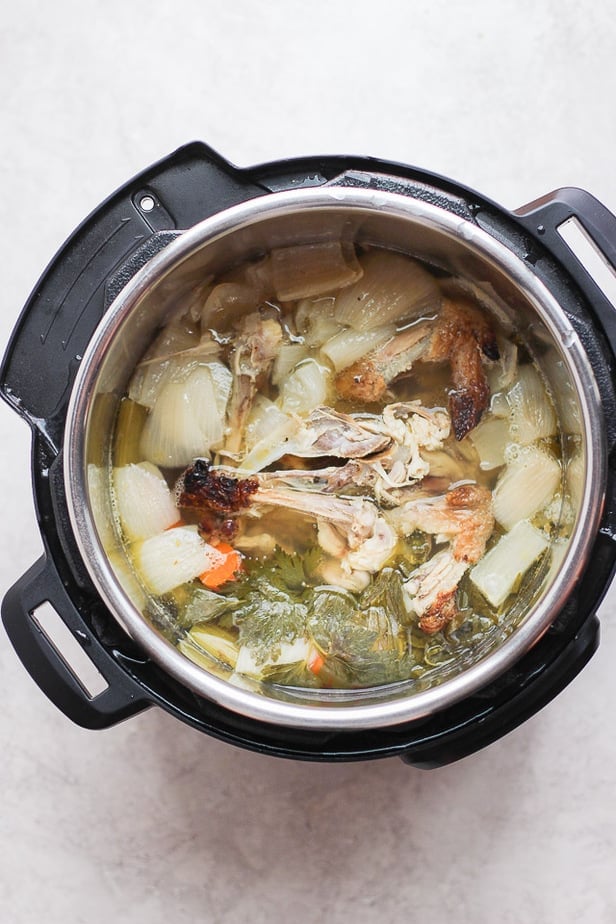
Cool and strain the stock into a glass container or right into a recipe, if needed.
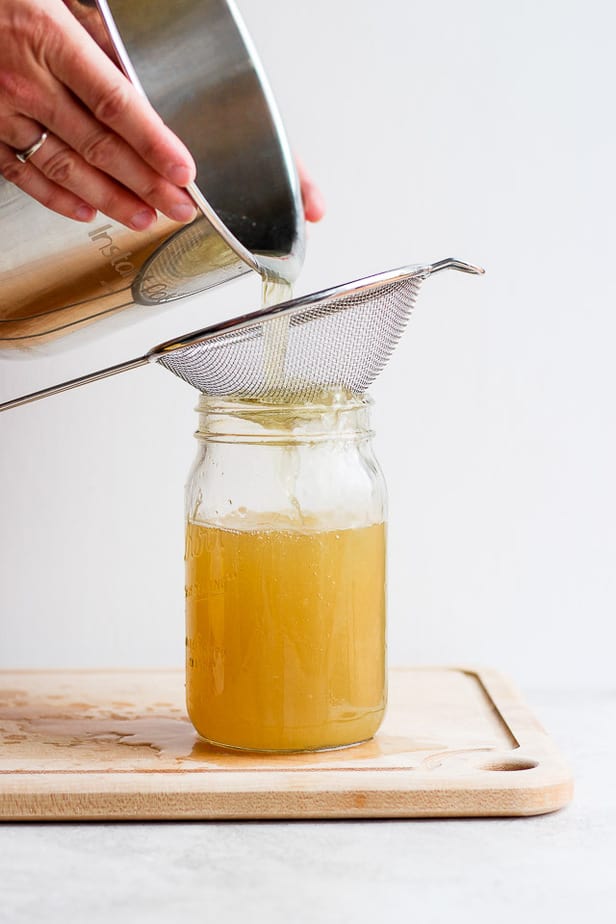
Recipes with chicken stock
- One Pot Chicken and Rice
- Lemon Chicken Piccata
- Pan Seared Chicken Thighs
- Skillet Chicken with Couscous
- Easy White Chicken Chili
- Mexican Chicken and Rice
- Kousa (Stuffed Squash)
- Mediterranean Ground Beef and Rice
- Risotto Stuffed Acorn Squash
- Lebanese Spinach Stew
Tips for making homemade stock
- Do not add salt. You want to be able to control the salinity of the recipe that the stock is added to, so it’s best to leave it unsalted.
- Vary up the herbs and spices to make it your own way. For instance, season with oregano and thyme if you know your stock is destined for a Mediterranean bean soup. Likewise, for Asian flavors, you can add fresh ginger.
- De-fat the chicken stock by refrigerating overnight. Then you can skim off the solidified fat on top before using in a recipe or freezing.
- Add more flavor by sauteing or roasting the vegetables beforehand. I don’t usually do this step, but it does help to boost the flavor if you’d like.
Frequently asked questions
Stock can be stored in the refrigerator or the freezer, in any appropriate container. To keep small amounts handy, consider freezing in ice cube trays and then transferring cubes to freezer bags.
The general rule is four days in the fridge and six months in the freezer.
The Joy of Cooking advises against using potatoes (which would thicken the stock) and cruciferous vegetables like broccoli, cabbage, and cauliflower, which can leave “an undesirably sulfurous note. ”
Yes! Try using chicken wings or a mix of various bones, the carcass, and other parts.
Stock made with bones that have been roasted or browned first is called brown stock and has a richer flavor than regular stock. You can certainly do that beforehand.
The first time I made soup with homemade stock from chicken bones, I could not believe how delicious and easy it was. Give it a try and let me know it goes.
For more cooking tutorials, check out:
- How to Make Oatmeal
- How to Cook Pasta Perfectly
- How to Cook Dry Chickpeas
- How to Cook Brown Rice
- How to Cook Quinoa Step by Step
- How to Make Homemade Marinara Sauce
- How to Make Oat Flour in Vitamix
- How to Make Pesto
If you’ve found this cooking resource for How to Make Chicken Stock helpful or if you’ve tried any recipe on Feel Good Foodie, then don’t forget to rate the recipe and leave me a comment below! I would love to hear about your experience with this technique. And if you snapped some shots of it, share it with me on Instagram so I can repost on my stories!
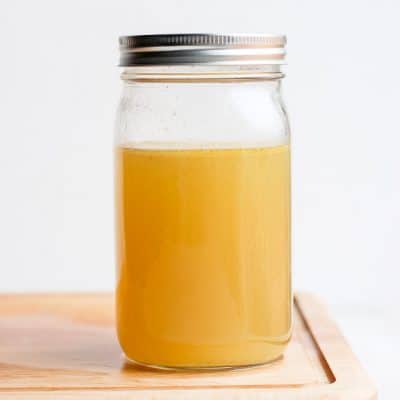
How to Make Chicken Stock
Ingredients
- 1 chicken carcass cut smaller with a cleaver (Cutting is optional)
- ½ white onion cut in large pieces
- ½ carrot cut in large pieces
- 1 celery stalk cut in four pieces
- 1 bay leaf
- 6 sprigs herbs thyme, parsley, tarragon, etc.
- 6 cups cold water or enough to cover ¾ of the bones and vegetables
Instructions
Stovetop Method
- Place vegetables and herbs in a stock pot, then place the chicken bones on top.
- Add the cold water.
- Slowly bring the stock to a simmer, skim any fat or foam that comes to the surface.
- Once the stock has come to a simmer, continue to cook covered for 4 hours.
- Cool and strain the stock. Makes about 4 cups.
Instapot Method (pressure cook)
- Place vegetables and herbs in the Instapot, then place the chicken bones on top.
- Add the cold water.
- Seal the lid and select High Pressure for 20 minutes or use the stock setting on the pressure cooker.
- Once the time is up, release pressure naturally.
- Cool and strain the stock. Makes about 4 cups.
Equipment
Notes
Nutrition
Nutrition information provided is an estimate. It will vary based on cooking method and specific ingredients used.






Comments
Great easy to follow instructions and photos. Thank you. If I want to use the stock for making chicken noodle soup, will I need to add salt at that point and will it need to be diluted? Also, can you cook matzah balls in this stock or do you add cooked matzah balls to the stock? Any other seasonings you might add to the stock besides salt when serving it as soup?
Sure, you can add salt while making the stock or once you’re making the chicken noodle soup. I prefer to leave the salt out of the stock so that it’s more versatile for many recipes. You can cook matzah balls in this stock or add them after the stock is cooked. As for additional seasonings, I think it has a ton of flavor from all the fresh herbs, but you can use anything you like!
Do you use rotisserie chicken carcasses? I’ve heard mixed things on this.
Yes! Try using chicken wings or a mix of various bones, the carcass, and other parts.
Thank you.
But I was raise with Chicken Broth not chicken stock. I have tried Chicken Stock and I preferer Chicken Broth.
What is the difference between Chicken Stock and Chicken Broth?
Many use the terms interchangeably, but they are different. They both contain chicken and vegetables, typically the standard mirepoix mix of onions, carrots, and celery. But stock always includes chicken bones. When cooked long and slow, the bones yield up their gelatin and collagen giving the stock a rich, smooth texture.
Also, another notable difference is that stock is unsalted while, broth is a flavored, seasoned, sippable soup.
Very helpful thank you Yumna! I just want to highlight the importance of adding 1 tbsp of apple cider vinegar that will help release the collagen and nutrients from the bones
You’re so welcome! Thanks for that tip!